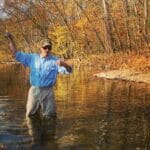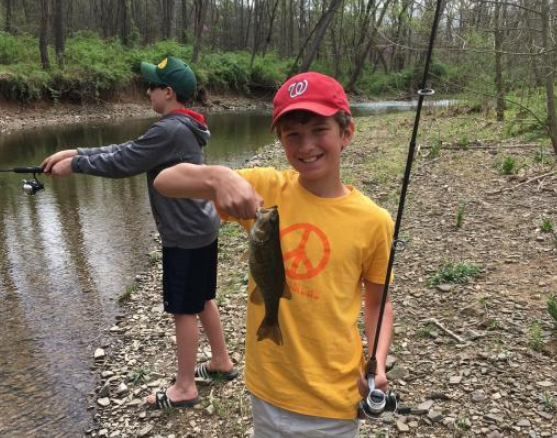The day Casey turned 11, the Environmental Protection Agency announced it was rescinding the 2015 Clean Water Rule and replacing it with one that might not apply the protections of the Clean Water Act to small and seasonal streams. On his birthday weekend, Casey asked that we take his brothers and some friends to West Virginia to swim and fish in a small seasonal stream we enjoy as a family (see the two attached pictures).
The irony is striking.
A few basic ideas drive conservation in America. For example, everyone deserves a right to clean water and air. The greater access people have to the waterways and the outdoors, the more passionate they defend them. And some places should be protected from development, and kept as God made them.
Three announcements in the past week have the potential to compromise these basic principles.
In addition to the EPA questioning whether the Clean Water Act should apply to small streams (as it did for the first 30 years of the law), Secretary of the Interior Zinke’s review of national monuments ended yesterday. Thirty TU state councils stepped up and asked the Secretary to hold the line on keeping our access to our most protected national monuments intact. Lastly, the EPA announced that it was withdrawing its own 2015 proposal to protect Bristol Bay—the world’s most productive and important salmon fishery—from industrial mining.
Not dissimilar to gathering a few 11 year olds for a swim in a small rural river, one of the challenges for conservationists is not falling victim to Chicken Little and overstating the risks of various government proposals.
A review of national monuments, for example, does not by itself mean that these natural treasures will be diminished. And there can be no doubt that in the past, EPA, while generally doing a good job of protecting our water and air, has sometimes been its own worst enemy through enforcement overreach or bureaucratic opacity.
We haven’t had a King in America for 235 years. As a result, the Trump administration will be required to follow the law and solicit the views of sportsmen and women, and all other citizens, before they weaken rules that protect small streams; shrink the size of monuments; or allow a foreign mining company access to industrialize the pristine Bristol Bay landscape.
That said, those of us who fish and hunt need to be eyes-wide-open about what is at risk, including the protection of small headwater streams that my family love to swim and fish in, and that provide the cold, clean water upon which trout and salmon depend. If the federal government chooses to limit the Clean Water Act to large, “navigable waterways” some, perhaps even half of states will pick up the task of protecting seasonal streams, but if you live a state that chooses not to clean water, fishing, and your health will likely suffer.
We could shrink national monuments such as the Rio Grande del Norte which protects 60 miles of exceptional wild trout fishing in New Mexico, or the Cascade–Siskiyou which protects a unique and rare strain of redband trout in Oregon, and diminish our opportunity to fish for wild and native fish.
In Bristol Bay, we could allow a foreign mine to compromise the watershed that provides half of the world’s wild sockeye salmon, and the river that is annually one of the top producers of chinook. The company that wants to build the Pebble mine says they will submit a permit. They have said that for 14 years—including four years after the senior Republican Senator from Alaska asked them to submit one. They have yet to do so. In the meantime, the sword of Damocles hangs over the 14,000 annual jobs and $1.6 billion fishing industry that stands to be ruined by the industrialization of the Bristol Bay watershed which will be necessary to build the mine.
Many would say these announcements are a cynical effort to weaken the heart of American conservation. If so, they are also an opportunity for us sportsmen and women—the people who value clean water, public lands, and our healthiest habitats the most—to make sure that we are not taken for granted by one political party and ignored by the other.
Casey and I will swim and fish in our West Virginia river this weekend. When we get back, you can be darn sure we will both make sure our government understands that clean water is a right; national monuments need to be protected; and our most treasured landscapes such as Bristol Bay need to be protected.
We hope you will, too.



